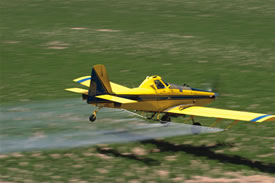Pesticides
Description

A pesticide is any substance used to kill, repel, or control certain forms of plant or animal life that are considered to be pests. Pesticides include herbicides for destroying weeds and other unwanted vegetation, insecticides for controlling a wide variety of insects, fungicides used to prevent the growth of molds and mildew, disinfectants for preventing the spread of bacteria, and compounds used to control mice and rats. Because of the widespread use of agricultural chemicals in food production, people are exposed to low levels of pesticide residues through their diets. Scientists do not yet have a clear understanding of the health effects of these pesticide residues. Results from the Agricultural Health Study, an ongoing study of pesticide exposures in farm families, show that farmers who used agricultural insecticides experienced an increase in headaches, fatigue, insomnia, dizziness, hand tremors, and other neurological symptoms. Evidence suggests that children are particularly susceptible to adverse effects from exposure to pesticides, including neurodevelopmental effects. People may also be exposed to pesticides used in a variety of settings including homes, schools, hospitals, and workplaces.
Health Studies & Clinical Trials
What NIEHS is Doing on Pesticides
- 12th Report on Carcinogens (RoC)
- A Human Health Perspective On Climate Change (4MB)
- Applying 21st Century Toxicology to Green Chemical and Material Design - Workshop Presentations from the National Academies Standing Committee on Use of Emerging Science for Environmental Health Decisions
- Child Development and Environmental Toxins (633KB)
- DDT and DDE: Second Generation Time to Pregnancy Effects
- Drug Used to Arrest Preterm Labor Sensitizes the Brain to Neurotoxins
- Effects of Organochlorine Compounds on Menstrual Cycles
- Frog Limb Deformities: Synergism Between Pesticide Exposure and Parasite Infection
- Hand to Mouth-Ingestion of Pesticides by Children Living on the US/Mexico Border
- High Pesticide Exposure Associated with Cognitive Decline (http://www.niehs.nih.gov/news/newsletter/2011/november/science-pesticide/index.cfm)
- Long-term Pesticide Exposure May Increase Risk of Diabetes
- More Evidence for Parkinson's Disease and Pesticide Link (DERT Profile - 2006)
- NIH Study Finds Two Pesticides Associated with Parkinson's Disease
- Organophosphates
- PestiBytes: A Podcast Series on Common Pesticide Questions
- Pesticide Exposure Raises Risk of Parkinson¿s Disease
- Role of Environmental Chemicals in Diabetes and Obesity: A National Toxicology Program Workshop Report (http://ehp03.niehs.nih.gov/article/fetchArticle.action?articleURI=info%3Adoi%2F10.1289%2Fehp.1104597)
- Role of Paraoxonase Enzyme Level and Polymorphisms in Pesticide Sensitivity
- Slight Neurobehavioral Performance Deficits Seen in Children from Agricultural Communities
- Trends of Persistent Pollutants in Umbilical Cord Blood of Inuit Infants
- Validating the Measurement of Environmental Chemicals in Amniotic Fluid as a Potential Biomarker of Prenatal Exposure
General Information
- Pesticide Action Network North America - PAN seeks to reduce the use of pesticides through more economically viable alternatives. Publishes reports on pesticide use, health effects, occupational safety, etc. Website also offers a Pesticide Database that allows you to search by chemical or product.
- Pesticide Exposure - The National Library of Medicine's (NLM) Enviro-health links website provides an excellent set of resources that address the relationship between pesticides and human health. The page provides links to selected websites on pesticide exposure, as well as on the treatment and prevention of pesticide poisoning.
- Pesticide Exposure: Public Service Announcement 2000
- Environmental Health Perspectives, Environews by Topic: Pesticides/Pest Management
- Evaluating Chemicals: Is It Safe? Movie (English & Spanish Versions)
- Some Natural Pesticide Alternatives (English) (114KB)
- Some Natural Pesticide Alternatives (Spanish) (221KB)
- Healthy Homes = Healthy Kids: Pest Control (English) (310KB)
- Healthy Homes = Healthy Kids: Pest Control (Spanish) (337KB)
- Healthy Homes = Healthy Kids: Pest Control (Arabic) (352KB)
For Educators
- EHP Student Edition Lesson: Arsenic and Lead Scavenger Hunt (357KB)
- EHP Student Edition Lesson: A Yen for Maximum Residue Limits in Food (144KB)
- EHP Student Edition Lesson: Is Organic Food Worth the Cost? (228KB)
- EHP Student Edition Lesson: Pyrethroid Panic (153KB)
- Libro para Colorear (781KB)
- Pesticide Safety: Elementary School Curriculum (4MB)
- Pesticide Safety: Preschool Curriculum (Bilingual) (5MB)

